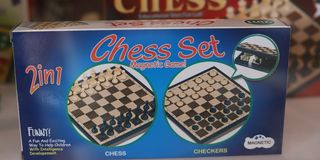The little known benefits of play to a child's development

A play pack of chess that children can use at home.
While many parents opt for screen time as a way to keep their children engaged, Boniface Wanjala, Kidogo franchise coordinator in Nakuru, recommends close attention to children while helping them learn through play.
Mr Wanjala notes that while the holiday is quite extended, there should not be a big gap between the learning of children in school and at home.
He mentions that introducing structured play; Solitary play, corporate play (play among many children) and parallel play, for children to learn through will actively engage their brain, thus promoting child development.

Boniface Wanjala , Kidogo franchise coordinator during an interview on November 2, 2024 at the Kidogo 10 years anniversary celebration.
“Learning on holidays does not have to compromise on the fun. You would be surprised if you introduce children to learning through play, they will not see it as a forced way to learn but would rather enjoy it,” he notes.
Additionally, he says, research shows that children below four years learn best through play material, however, this is not limited to age.
Here are a few items parents can introduce in the children’s play pack to enhance social -emotional learning.
Puzzles
While organizing the puzzle, children engage their brain in a fun way while also learning the need to give attention to details. Puzzles challenge children in a positive way and solving them makes them happy.
A puzzle can range between Sh 350 to Sh 1000.
Colouring
Colouring is a fun way parents can play with their children. This can foster great bonds with children while also helping them learn. Far away from solving mathematical solutions, colouring by numbers or items is a good way to improve a child’s memory.
This can be done with water paints, crayons among others.
Storybooks
While reading alone can bring boredom, having children read stories as a group can make it more interesting. While one child can serve as a storyteller, other children can be listeners. This greatly helps with a child's confidence.
Brain Games
Some games can be introduced for skill enhancing. Chess, scrabble, lego, Rubik’s cube are games that once mastered, sets the child as an active person. Although they may be hard to kick off, learning them can greatly help them in school and improve their attention.
Although most items mentioned here are to be purchased, Mr. Wanjala notes that parents can guide their children to make simple play items at home like bean bags, dolls from old clothes, toys, cars from boxes, manila balls.
In conclusion he says, other than helping with a child’s development, games also help children relax as they engage different muscles while doing different games.


